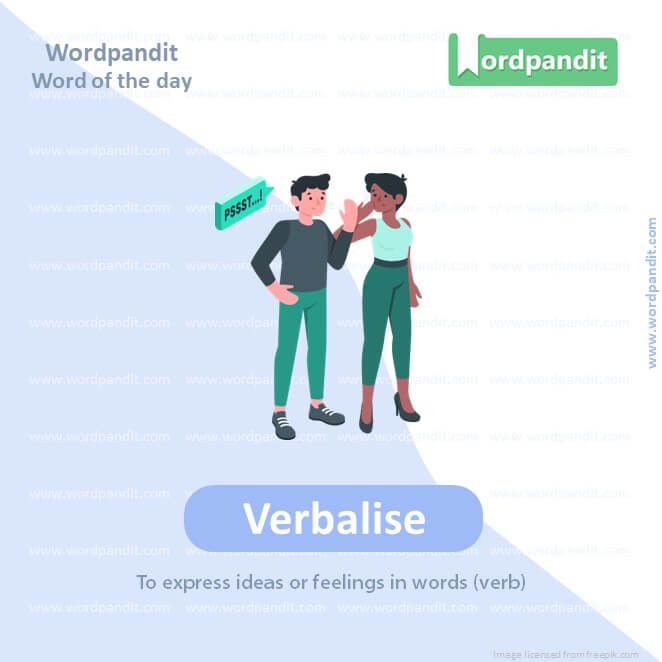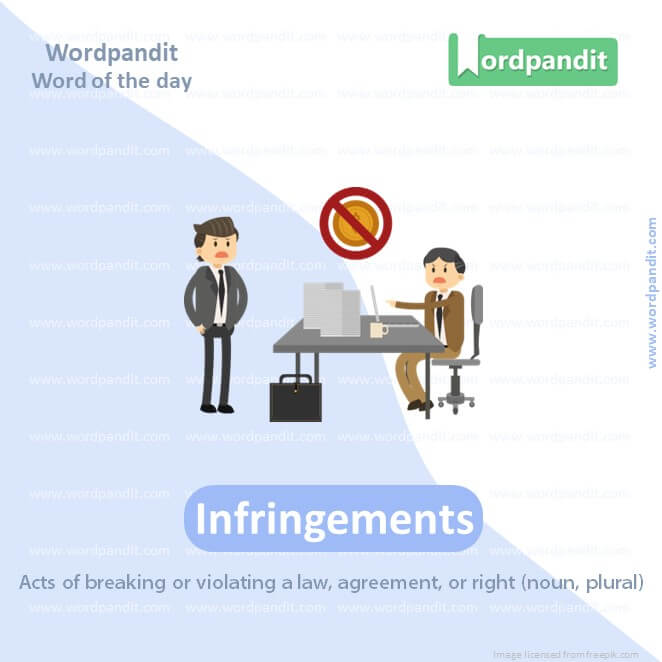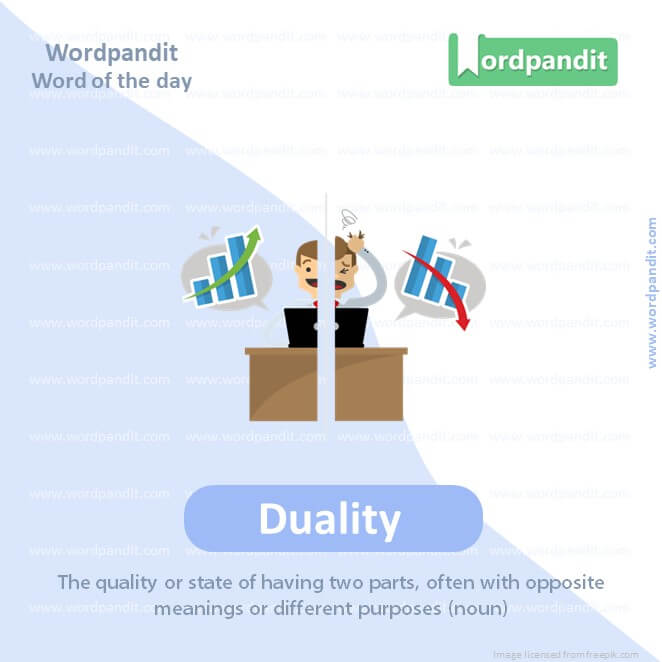Daily Vocabulary Words: List of Daily Used Words in Leading Indian Newspapers
Hi there. Welcome to this special section @ Wordpandit. Our endeavour here is straightforward: highlighting daily vocabulary words that you would come across in leading newspapers in the country. We have included the following newspapers in our selection:
• The Times of India
• The Economic Times
• Hindustan Times
• Mint
• Indian Express
We are putting in extensive work to develop your vocabulary. All you have to do is be regular with this section and check out this post daily. This is your repository of commonly used words; essentially, we are posting a list of daily used words. Hence, this has significant practical application as it teaches you words that are commonly used in leading publications mentioned above.
Visit the website daily to learn words from leading Indian newspapers.

WORD-1: Virality
CONTEXT: The year started with Microsoft deciding to invest $10 billion in the OpenAI project, at the heels of the virality of its ChatGPT, which, by February, had become the fastest-growing application.
SOURCE: Indian express
Explanatory Paragraph: Virality is like when something becomes really popular and everyone starts talking about it or sharing it, like a funny video that everyone keeps sending to their friends because they think it’s so funny.
Meaning: The quality or state of being viral, especially becoming very popular
and quickly spreading to many people (noun).
Pronunciation: vye-RAL-i-tee
Synonyms: popularity, contagiousness, spreadability, buzzworthiness
Usage Examples:
1. The video gained virality overnight and was viewed by millions.
2. They hoped the campaign would achieve virality.
3. Understanding the factors that contribute to virality can help marketers.
4. The post’s virality was unexpected.

WORD-2: Repatriated
CONTEXT: there’s a possibility that the sentenced prisoners can be repatriated to India.
SOURCE: Times of india
Explanatory Paragraph: Repatriated is like when someone has been away from home for a long time, maybe in another country, and then comes back home to stay.
Meaning: Sent back to one’s own country or original place (verb).
Pronunciation: re-PAY-tree-ay-ted
Synonyms: returned, sent back, restored, deported
Usage Examples:
1. After the conflict, refugees were repatriated to their homeland.
2. The government worked on programs to repatriate stolen cultural artifacts.
3. He was repatriated after spending decades abroad.
4. Artifacts have been repatriated to their country of origin.
WORD-3: Analogue
CONTEXT: This is a peculiar need with no analogue in the universe of content applications.
SOURCE: Hindustan times
Explanatory Paragraph: Analogue is a bit like having a toy that isn’t electronic and works in a simple way, like a clock with hands that move around to tell time, instead of showing numbers on a screen.
Meaning: Something similar or comparable to something else; or referring to a device or system that uses continuously variable signals (noun and adjective).
Pronunciation: AN-uh-log
Synonyms: comparable, similar, correspondent, equivalent, analogous
Usage Examples:
1. This system is an analogue of an earlier model.
2. Analogue technology, like vinyl records, has seen a resurgence.
3. They used an analogue to predict the outcome.
4. His work is an analogue to the research done in the earlier studies.

WORD-4: Verbalise
CONTEXT: Around this point, both industry and state actors started to verbalise what had been insisted on for a decade by AI academics, policy scholars, and social scientists, but was being soundly ignored by the industry.
SOURCE: Indian express
Explanatory Paragraph: Verbalise is when you take your thoughts or feelings and say them out loud with words, just like when you tell someone how your day was.
Meaning: To express ideas or feelings in words (verb).
Pronunciation: VUR-buh-lize
Synonyms: articulate, express, vocalize, utter, state
Usage Examples:
1. She struggled to verbalise her emotions.
2. The teacher asked the students to verbalise their thoughts.
3. He was able to verbalise his ideas clearly.
4. It’s important to verbalise concerns in a meeting.

WORD-5: Infringements
CONTEXT: Copyright infringements are accusations of using content created by someone else without either acknowledgement or payments.
SOURCE: Times of india
Explanatory Paragraph: Infringements are like when someone breaks the rules of a game. It’s when someone does something that is not allowed by a rule or law.
Meaning: Acts of breaking or violating a law, agreement, or right (noun, plural).
Pronunciation: in-FRINGE-ments
Synonyms: violations, breaches, contraventions, encroachments, transgressions
Usage Examples:
1. The company was fined for copyright infringements.
2. They discussed the infringements of privacy by the new policy.
3. Infringements on civil liberties have become a concern.
4. He was accused of several infringements of company protocol.

WORD-6: Duality
CONTEXT: The law responds to the duality of content and carriage chiefly by defining a “message” to include all types of content.
SOURCE: Hindustan times
Explanatory Paragraph: Duality is like having two sides to a coin. It means something has two different parts or aspects, which might be opposite but are connected in some way.
Meaning: The quality or state of having two parts, often with opposite meanings or different purposes (noun)
Pronunciation: doo-AL-i-tee
Synonyms: dualism, dichotomy, polarity, contrast, twofoldness
Usage Examples:
1. The duality of good and evil is a common theme in literature.
2. He explores the duality of human nature in his book.
3. The duality of her role in the company was challenging.
4. They discussed the duality of technology: its benefits and drawbacks.
WORD-7: Regulatory
CONTEXT: The holistic definition of a message and exclusion of references to OTT helps to distinguish between regulatory frameworks for content and carriage services.
SOURCE: Hindustan times
Explanatory Paragraph: Regulatory is like the rules you have to follow in school, like raising your hand to speak. It’s about making sure everyone follows the rules that are set up to keep things fair and safe.
Meaning: Relating to or concerned with rules or regulations (adjective).
Pronunciation: REG-yuh-luh-tor-ee
Synonyms: controlling, governing, supervisory, directive, authoritative
Usage Examples:
1. The company faced strict regulatory requirements.
2. They are subject to the regulatory authority of the agency.
3. Regulatory changes could impact the industry significantly.
4. The regulatory framework for telecommunications is complex.
WORD-8: Disseminate
CONTEXT: the constitutional right to disseminate content online has no analogue in the world of carriage infrastructure and requires specialised regulatory treatment.
SOURCE: Hindustan times
Explanatory Paragraph: Disseminate is like when you scatter seeds in the garden to grow plants everywhere. It means spreading information or knowledge so that many people can know about it.
Meaning: Spread or disperse (something, especially information) widely (verb).
Pronunciation: di-SEM-ih-nate
Synonyms: distribute, spread, circulate, broadcast, propagate
Usage Examples:
1. They disseminated the information through social media.
2. The organization aims to disseminate knowledge about health.
3. He helped disseminate critical updates during the emergency.
4. The study’s findings were widely disseminated.
WORD-9: Commuted
CONTEXT: That Qatar’s Court of Appeals has commuted the death sentence handed down to eight Indian ex-navy personnel is unqualified good news.
SOURCE: Times of india
Explanatory Paragraph: Commuted is when someone changes a punishment to something less severe, like if you were supposed to clean your room for a week as a punishment, but it was changed to just one day.
Meaning: Reduced a judicial sentence to one that is less severe (verb).
Pronunciation: kuh-MYOOT-ed
Synonyms: reduced, substituted, changed, altered, lessened
Usage Examples:
1. His sentence was commuted from ten years to three.
2. The governor commuted the sentences of four inmates.
3. Her penalty was commuted as part of a plea bargain.
4. They commuted his ban from professional sports.
WORD-10: Explicitly
CONTEXT: For example, Singapore and Malaysia explicitly recognise their differences and regulate the two separately.
SOURCE: Hindustan times
Explanatory Paragraph: Explicitly is like when you tell someone exactly how to play a game so there’s no confusion. It means saying or explaining something in a very clear and detailed way, without any confusion.
Meaning: In a clear and detailed manner, leaving no room for confusion or doubt (adverb).
Pronunciation: ik-SPLIS-it-lee
Synonyms: clearly, plainly, unequivocally, directly, unambiguously
Usage Examples:
1. The rules were explicitly stated in the document.
2. He explicitly refused to comply with the request.
3. The terms must be explicitly agreed upon.
4. She explicitly instructed them on how to proceed.
Vocabulary Daily Use Words
In the architecturally diverse world of language learning, ‘vocabulary daily use words’ act as a cornerstone. We often take these words for granted, but their significance in day-to-day communications is nothing short of monumental. Mastering these ‘vocabulary daily use words’ should be more than an ancillary task on the sideline; it should take the center stage in your language learning journey.
To begin with, approach ‘vocabulary daily use words’ with the same gusto and reverence as you would an untapped treasure chest. Go beyond the conventional realm of textbooks and explore the world of contemporary literature, newspapers, and digital content. By immersing yourself in these mediums, you’re aligning your learning with real-world language usage, thereby gaining a practical understanding of ‘vocabulary daily use words.’
Memory-enhancing tools add an extra layer of effectiveness to your learning. Flashcards, for example, are a great way to make your study sessions interactive and memory-forging. Coupled with the Leitner system, which is a principle of spacing and repetition, you can ensure better recall and understanding of ‘vocabulary daily use words.’
Furthermore, leveraging mnemonic devices aids in etching the ‘vocabulary daily use words’ into your memory. Associating common words with unique and memorable narratives in your mind enhances their recall. Regular revision and using these words in routine conversations further cement your proficiency.
The potency of immersion as a language learning strategy cannot be emphasized enough. Conversing with native speakers, if possible, provides context to ‘vocabulary daily use words’ and boosts your fluency.
In conclusion, mastering the ‘vocabulary daily use words’ is an enriching journey that requires ongoing effort, continual exposure, and hands-on practice. The strategy of learning through various mediums, using memory-enhancing techniques, leveraging mnemonic devices, and immersion can help demystify these words and enhance your overall language proficiency. So, gear up and embrace the linguistic adventure of mastering the ‘vocabulary daily use words.’













